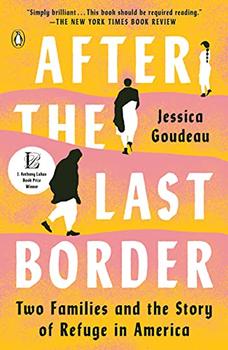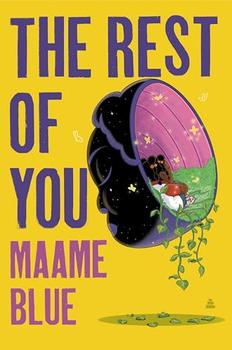Summary | Excerpt | Reading Guide | Reviews | Beyond the Book | Readalikes | Genres & Themes | Author Bio

Two Families and the Story of Refuge in America
by Jessica Goudeau
When it was her turn, she and Saw Ku were chosen to be among the first groups to resettle in the United States from Mae La. Her Buddhist mother called it luck; her Christian mother-in-law praised God's hand in the UN selection process. Mu Naw thought perhaps it was a bit of both. There were thousands of people in Mae La camp who would give anything to be her, walking purposefully past her neighbors with bright plastic bags on her arm.
When they rounded the corner on the baggage carousel, Mu Naw was surprised that the bags that had felt foreign and new just days before now seemed intimately familiar, as if they had been with her all of her life. In her IOM sack, tucked inside her own woven bag, she had her passport and her daughtersÕ passports and the important documents they brought with them. In the checked bags, they had packed what was left: T-shirts, tunics, and two pairs of jeans for Saw Ku, woven tunics and skirts for Mu Naw and the girls, a few extra for them to wear as they grew. There were albums with pictures of each of their relatives, a jar of thanaka for the girlsÕ faces, cream for Mu NawÕs skin, a few clips for their hair, underwear and combs and toothbrushes. And that was it. There was nothing else to take.
Seeing their bags, Mu Naw felt a pang for the box of letters she had left behind. Two days before she left, she found a tree near enough to her hut that she could find it again someday but far enough away where it would not be disturbed by her neighbors. She had dug a small hole in the hard clay dirt and placed a tin box near the roots of the tree. In it were all of the letters she and Saw Ku had written to each other over the months when they first admitted they liked each other when they were fifteen, saying on paper what they were too shy to express out loud. She had thought about taking the box, but she was not sure what would happen in their new place. This camp seemed more constant, more real than the fantastical new life she would lead in America.
As she watched the white woman and Karen man talking to Saw Ku about the bags, at the end of an exhausting journey that spanned endless, monotonous hours, Mu Naw suddenly knew with a deep certainty she had made the wrong choice. She had thought she would go back with her daughters to dig up the letters in a few years. The idea of ever returning now seemed impossible; the English that had been a novelty spoken only by UN workers now engulfed her. The loss hit her in a powerful wave of grief. She could close her eyes and see the sun shining through the expansive green leaves of the tree, feel the muggy air on her skin, the claylike dirt beneath her sandals. It was perfectly clear in her mind but the tree was on the other side of the world, standing vigil over the teenage love she had shared with her husband; the tin box would rust, the letters disintegrate. Her daughters would never read them. She moved forward numbly, feet shuffling on the cold linoleum.
The car ride from the airport to their new home was a dizzying, exhilarating experience. They had walked on a crosswalk where cars paused politely. The white woman led them around to the side of a dark van and showed them how to buckle their children into the car seats. The children slept, mouths open in exhaustion. They skimmed the smooth highway into town, the lights and buildings whizzing past at a rate that left her dazed. Mu Naw gripped the armrest, body hunched against the window in an effort not to throw up or cry or succumb to the powerful emotion she could not name that pressed down on her. She had only ridden in a car a handful of times in her life and it was nothing like this, the flight of an efficient machine through an electric landscape she had never imagined existed.
They parked their car in a circle of light under a street lamp at an apartment complex with iron gates that were open. The air smelled like asphalt and clean laundry. The white woman and the Karen man took their bags and led them to an apartment on the first floor with a faint hint of cigarette smoke.
Excerpted from After the Last Border by Jessica Goudeau. Copyright © 2020 by Jessica Goudeau. All rights reserved. No part of this excerpt may be reproduced or reprinted without permission in writing from the publisher.




A library is thought in cold storage
Click Here to find out who said this, as well as discovering other famous literary quotes!
Your guide toexceptional books
BookBrowse seeks out and recommends the best in contemporary fiction and nonfiction—books that not only engage and entertain but also deepen our understanding of ourselves and the world around us.